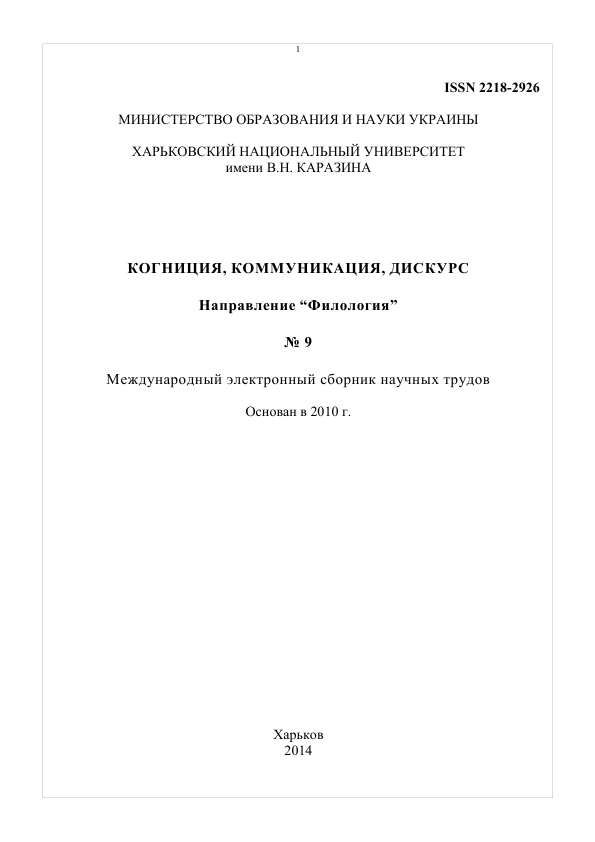Communicative strategies of international business negotiations (IBN) viewed synergistically
Abstract
The purpose of the paper is to excite theoretical interest in a synergistic approach to speech communication based on the principles of functional self-organizing systems operating in materially embedded ecological settings. The above approach is based on the principle of complex systems self-organization and their interaction with their extra-linguistic environment. Such systems, known in synergistics as “dissipating” or “embedded” (Prigogine1991) ones, are characterized by dynamic inner interaction of the components and integration, as subsystems, into more complex systemic entities. It is shown that in the process of the subsystems integration, their mutual accommodation is taking place, i.e. a balance is being established between their autonomy and their mutual dependence. It is claimed that the mutual adaptation principle also operates in the sphere of human interaction, cross-cultural communication including. The sphere if International Business Negotiations (IBN) is chosen as a specific example in order to illustrate how the above principle works in the concrete circumstances of cross-cultural communication, which can be described as a “give-and-take” process of mutual communicative adaptation. A survey of interdisciplinary IBN literature is presented and some basic assumptions that trigger off synergistic thinking about IBN are discussed. It is shown that within the general synergistic paradigm, the recently advanced Communication Accommodation Theory seems to provide the best-defined theoretical framework for studying IBN by integrating an interdisciplinary synergistic approach with a communicative focus.
Downloads
References
Cai, D.A., Drake, L.E. (2001). The business of business negotiation: intercultural perspectives. Communication Yearbook, 21, 15-31.
Chomsky, N. (1965). Aspects of a Theory of Syntax. Cambridge MA: MIT Press
Drake, L.E. (1995). Negotiation styles in intercultural communication. International Journal of Conflict Management, vol. 6, 1, 72-90
Fayerweather, J., Kapoor, A. (1976). Strategy and negotiations for the international corporation. The International Executive, v.18, Issue 2, 20-22
Fransis, J.N.P. (1991). When in Rome? The effects of cultural adaptation on international business negotiations. Journal of International Business Studies, 22, 403-428
Gallois, C., Giles, H., Jones, E., Cargile, A., & Ota, H. (1995). R. Wiseman (ed.). Accommodating intercultural encounters: Elaborations and Extentions. Thousand Oaks, CA: Sage.
Giles, H., & Powesland, P. (1975). Speech Style and Social Evaluation. London: Academic Press
Giles, H., Coupland, N., & Coupland, J. (1991). Accommodation theory: Communication, context and consequences. In: Contexts of Accommodation. Cambridge, UK: CUP, pp. 1-68
Gudykunst, W.B. (1997). Cultural variability in communication. Communication Research, 24, 327-348.
Haken, G. (1991). Informatsiya i samoorganizatsiya [Information and self-organization]. Moscow: MIR Publ.
Hawes, L. (1999). The dialogics of conversation: Power, control, vulnerability. Communication Theory, 9, 229-264.
Hofstede, G. (1980). Culture’s Consequences: International Differences in Work-related Values. Beverly Hills, CA: Sage.
Hui, C.H. (1980). Measurements of individualism-collectivism. Journal of Cross-Cultural Psychology, 17, 225-248
Jones, E., Gallois, C., Barker, M. (1999). Strategies of accommodation: development of a coding system for conversational interaction. Journal of Language and Social Psychology, June, 123-151.
Prigogine, I., Stengers, I. (1987). Order out of chaos: man's new dialogue with nature. Toronto, New York, NY: Bantam Books.
Prigogine, I.G. (1991). Priroda i novaya ratsionalnost’ [Nature and a new rationality]. Filosofiya i zhyzn – Philosophy and Life, 75-23 (in Russian)
Putman, L.L., Wilson, S.R. (1989). Argumentation and bargaining strategies as discriminators of intergrative outcomes. In: Managing Conflict: An Interdisciplinary Approach. New York: Praeger, pp. 121-141
Rezhabek, E.Ya. (2009). Synergeticheskoye predstavleniye o sotsialnoy realnosti [A synergistic idea of social reality] In: Synergeticheskaya paradigma. Sotsialnaya synergetika [The synergistic paradigm. Social synergistics]. Moscow, 218 p.
Schegloff, E.A. (1991). Conversation analysis and socially shared cognition. In: Resnick, L.B., Levine, J.L. & Teasley, S.D. (eds.). Perspectives on Socially Shared Cognition, pp. 150-170
Schwartz, B.D. (1993). On explicit and negative data effecting and affecting competence and linguistic behavior. Studies in Second Language Acquisition ,15.2, 147-63.
Taylor, J.R. (2001). The “rational“ organization reconsidered: an exploration of some of the organizational implications of self-organizing. Communication Theory, 11/2, May, 137-177.
Thompson, L., Hastie, R. (1990). Social Perception in Negotiation. Organizational Behavior and Human Decision Processes, 47(1), 98-123.
Ting-Toomey, S. (1988). Conflict styles in black and white subjective cultures. In: Kim, Y. (ed.). Current Research in Interethnic Communication. Beverly Hills, CA: Sage, pp. 75-89
Triandis, H.C. (1987). Collectivism vs. individualism: a reconceptualization of a basic concept in cross-cultural social psychology. In: Verma, G.K. & Bagley, C. (eds.). Cross-Cultural Studies of Personality, Attitudes, and Cognition. New York: St. Martin’s Press, pp. 12-35
Walker, G.B. (1990). Cultural orientation of argument in international disputes: negotiating the Law of the Sea. In: Korzenny, F. & Ting-Toomey, S. (eds.). Communicating for Peace: Diplomacy and Negotiation. Newbury Park, CA: Sage, pp. 43-60
Weiss, St. E. (1994). Negotiating with "Romans"- Part 2. Sloan Management Review, 116-201.
White, C.H., Burgoon, J.K. (2001). Adaptation of communicative design: patterns of interaction in truthful and deceptive conversations. Human Communication Research, v. 27, 1, 9-37.
Authors, who publish with this journal, accept the following conditions:
The authors reserve the copyright of their work and transfer to the journal the right of the first publication of this work under the terms of the Creative Commons Attribution License (CC BY), which allows other persons to freely distribute a published work with mandatory reference to the authors of the original work and the first publication of the work in this journal.
Authors have the right to enter into separate additional agreements for the non-exclusive dissemination of the work in the form in which it was published by this journal (for example, to post the work in the electronic institutions' repository or to publish as part of a monograph), provided that the link to the first publication of the work in this journal is given.
The journal policy allows and encourages the authors to place the manuscripts on the Internet (for example, in the institutions' repositories or on personal websites), both before the presentation of this manuscript to the editorial board and during review procedure, as it contributes to the creation of productive scientific discussion and positively affects the efficiency and dynamics of citing the published work (see The Effect of Open Access).




